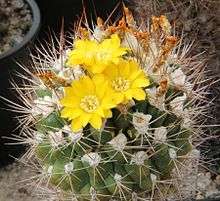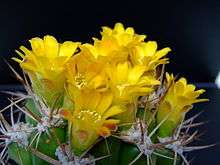Weingartia
Weingartia is a genus in the family Cactaceae, with species native to Bolivia and Argentina.
| Weingartia | |
|---|---|
 | |
| Weingartia westii | |
| Scientific classification | |
| Kingdom: | |
| (unranked): | |
| (unranked): | |
| (unranked): | Core eudicots |
| Order: | |
| Family: | |
| Subfamily: | |
| Tribe: | |
| Genus: | Weingartia Werdermann 1937
etc. |
Distribution
Andes mountains of central and south Bolivia and northwest Argentina at elevations of 1600 – 3600 m.
Description

Plants usually solitary. Stems globose to oblong, to 20 cm high and 15 cm, rarely 30 cm in diameter, fresh green. Ribs 12 - 18, spiraling, forming distinct tubercles. Areoles on the tubercle in excentric position, sunken in its higher part. Spines more robust and thick, 7 – 35 in one areole, radial spines 1 – 3 cm long, central spines 3 - 4, to 5 cm long. Flowers borne near the stem tips, one areole can produce up to 3 flowers, golden yellow to orange to reddish yellow, 1 – 3 cm in diameter. Floral tube scales broad and imbricated. Fruits globose to ovoid, brownish. Seeds oblong, 1 mm long, black or brown.
Taxonomy
The genus Weingartia was designated in 1937 by Werdermann to replace invalid genus Spegazzinia Backeberg 1933. All species of the genus Weingartia were transferred to synonymy status under the genus Rebutia (Hunt & Taylor, 1990; Hunt, 1999, Anderson 2001).[1] More recent research has indicated that the genus Rebutia as currently defined is polyphyletic. Sulcorebutia and Weingartia were kept as separate genera in the study; a summary cladogram for those species studied is shown below.[2]
| |||||||||||||||||||||||||||||||
Species formerly classified as Weingartia, Sulcorebutia and Cintia Kníže & Říha show a close relationship to each other. The larger group of species of Rebutia studied, those with hairy or bristly pericarpels, form a separate, more distantly related clade (Rebutia I). It is suggested that these be excluded from the genus Rebutia. [2][3]
List of species
List of species accepted by The Plant List Org.[4]
- Weingartia fidaiana (Backeb.) Werderm.
- Weingartia kargliana Rausch
- Weingartia lanata F. Ritter
- Weingartia neocumingii Backeb.
- Weingartia neumanniana (Backeb.) Werderm.
- Weingartia westii (Hutchison) Donald
First description list
|
Subgenus Weingartia
|
Subgenus Cumingia
|
References
| Wikimedia Commons has media related to Weingartia. |
- International Cactaceae Systematics Group
- Ritz, Christiane M.; Martins, Ludwig; Mecklenburg, Rainer; Goremykin, Vadim & Hellwig, Frank H. (2007), "The molecular phylogeny of Rebutia (Cactaceae) and its allies demonstrates the influence of paleogeography on the evolution of South American mountain cacti", American Journal of Botany, 94: 1321–1332, doi:10.3732/ajb.94.8.1321, PMID 21636499. Summary cladogram based on Fig. 2.
- Stefano Mosti, Nadeesha Lewke Bandara y Alessio Papini,Further insights and new combinations in Aylostera (Cactaceae) based on molecular and morphological data. Pak. J. Bot., 43(6): 2769-2785, 2011
- http://www.theplantlist.org/browse/A/Cactaceae/Weingartia/
Literature
- Augustin K.: Weingartia: history, description and reclassification. Cactus & Co. 7. (2): 91-126, 2003
- Ritter Fr.: Kakteen in Südamerika, Spangenberg, 1980.
- Anderson E. F.: The Cactus Family, Timber Press, Portland, Oregon, 2001.